
The Lighthouse of Genoa, known as La Lanterna, is the main lighthouse serving the Port of Genoa. Besides being an important aid to night navigation in the vicinity, the tower serves as a symbol and a landmark for the city of Genoa. Rebuilt in its current shape in 1543 replacing the former lighthouse, it is the world's fourth oldest lighthouse, following the Tower of Hercules in A Coruña, Spain, Hook Head Lighthouse in Ireland, Kõpu Lighthouse, on the island of Hiiumaa, Estonia. Built of masonry, at 76 m (249 ft), it is constructed in two square portions, each one capped by a terrace. The whole structure is crowned by a lantern from which the light is shone.

Capo dell'Armi Lighthouse is an active lighthouse in Reggio Calabria, southern Italy. Located along the cliffs of the headland, in the comune of Motta San Giovanni, it is an important reference for ships coming into the Strait of Sicily from the south.

Capo dell'Arma Lighthouse is an active lighthouse in northwestern Italy. It is located on a cape near the village of Bussana in the comune of Sanremo, in the province of Imperia. It is the first lighthouse on the Ligurian coast, starting from the French border.

Capo Mele Lighthouse is an active lighthouse in northwestern Italy. It is located on Capo Mele, on the border of the comunes of Andora and Laigueglia in the Province of Savona in Liguria.

Bari Light, also known as Punta San Cataldo di Bari Lighthouse is an active lighthouse placed at the base of Molo San Cataldo, on the west side of the harbour of Bari on the Adriatic Sea, in the southern region of Apulia, Italy.

The Livorno Lighthouse is an active lighthouse located at the south entrance of the Port of Livorno in Tuscany on the Ligurian Sea.

Palmaiola Lighthouse is an active lighthouse, placed on the summit of the same name islet, in the Tuscan Archipelago between Piombino and Elba in Rio Marina.

Punta Tagliamento Lighthouse is a lighthhose in Bibione a frazione of San Michele al Tagliamento, Veneto on the coast of the Adriatic Sea. It is placed on the beach protected by several seawalls placed as erosion control.

Portofino Lighthouse is an active lighthouse located in Portofino, Metropolitan City of Genoa, Liguria, northern Italy, on the western extremity of the peninsula in the Gulf of Tigullio.
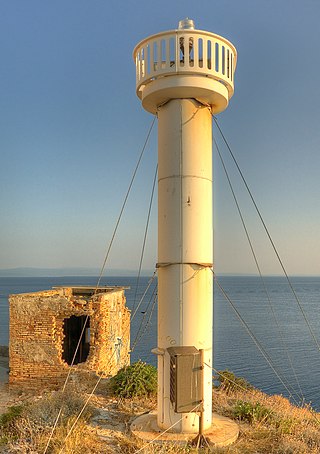
Punta del Diavolo Lighthouse is an active lighthouse located on the western point of Isola San Domino, one of the Tremiti in Apulia on the Adriatic Sea.
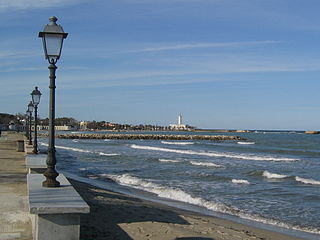
Punta San Cataldo di Lecce Lighthouse is an active lighthouse located on the eastern point of San Cataldo di Lecce in the Salentine Peninsula 12 kilometres (7.5 mi) from Lecce on the Adriatic Sea.

Camogli Molo Esterno Lighthouse is an active lighthouse located at the end of the external breakwater of the harbour of Camogli, Liguria on the Ligurian Sea.
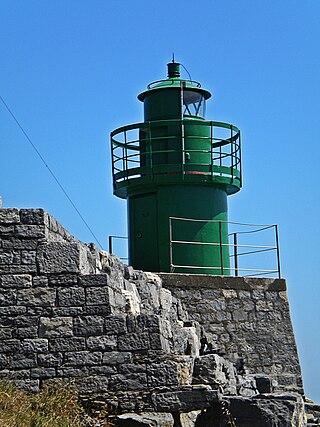
Punta Santa Teresa Lighthouse is an active lighthouse located at the east side, opposite to the outer breakwater of the gulf of La Spezia, in the municipality of Lerici, Liguria on the Ligurian Sea.

Punta Vagno Lighthouse is an active lighthouse located on the same name Cape at the east entrance of the Port of Genoa, Liguria on the Ligurian Sea.

Capo di Vado Lighthouse is an active lighthouse located on the prominent Capo di Vado, 1.5 kilometres (0.93 mi) south of Vado Ligure, Liguria on the Ligurian Sea.
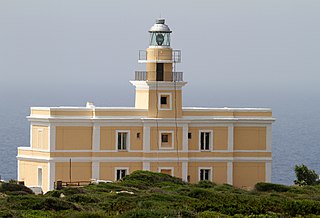
Capo San Marco Lighthouse is an active lighthouse located on Capo San Marco promontory, on the tip of Sinis peninsula overlooking the ruins below of Tharros. The structure is in the municipality of Cabras, in the west of the island on the Sea of Sardinia.

Punta Filetto Lighthouse is an active lighthouse located on the Isola Santa Maria, which makes part of the Maddalena archipelago, on the northern point of the island facing Barrettinelli di Fuori Lighthouse from which it is 1.4 kilometres (0.87 mi) away. The island is in the municipality of La Maddalena on the Tyrrhenian Sea.

Torre Grande Lighthouse is an active lighthouse located atop a coastal tower on the sea front of Marina di Torre Grande, Sardinia on the Sea of Sardinia.
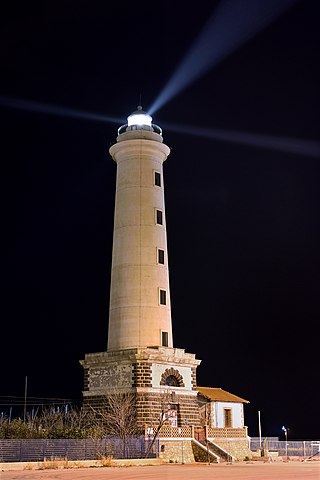
The San Giacomo Lighthouse is an active lighthouse at the root of the east wharf of the commercial harbour of Licata on the Channel of Sicily. The lighthouse takes its name from the homonymous castle once on the site, then later destroyed to make room for the seaport.

Lido Fanale Anteriore Lighthouse is an active lighthouse located on the northern tip of the island of Lido di Venezia, in the Venetian Lagoon on the Adriatic Sea; the place where is the main access to Venice by ship route.





















